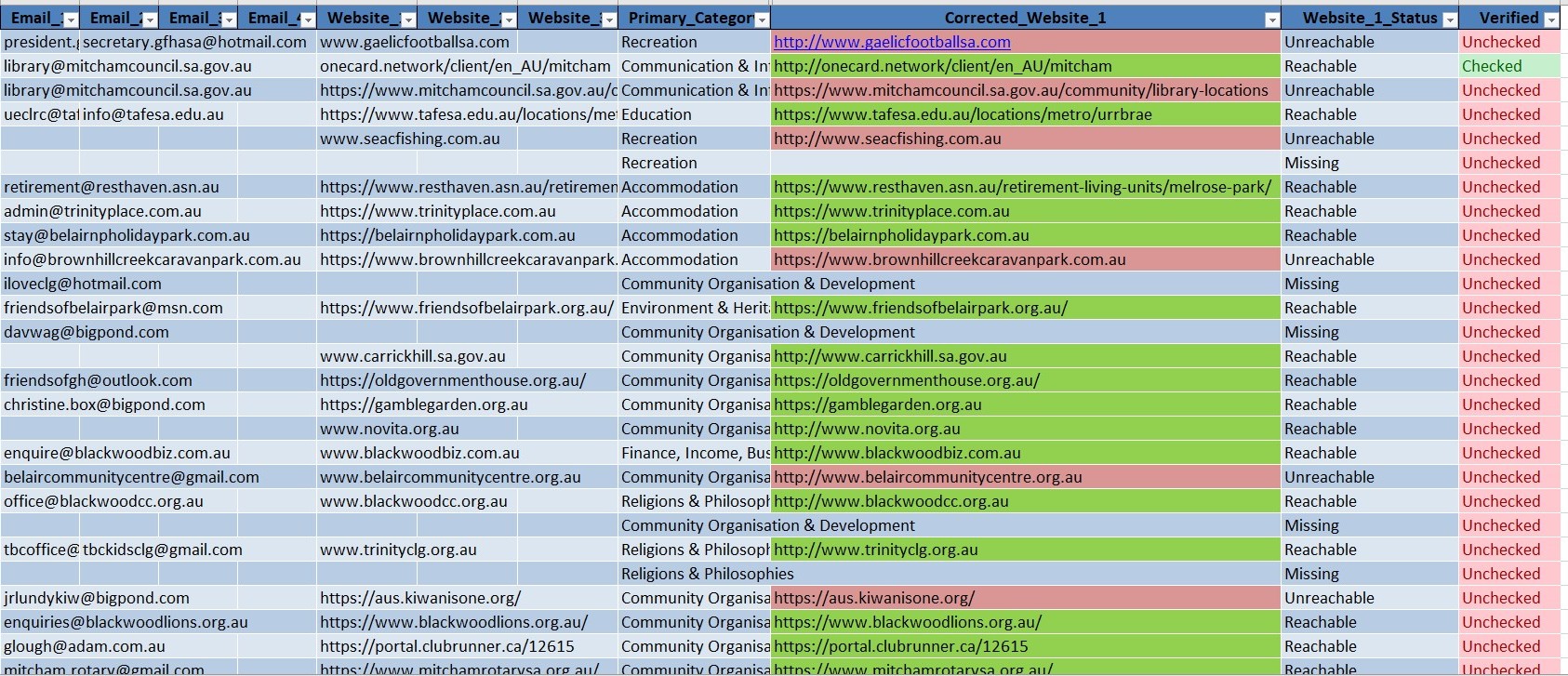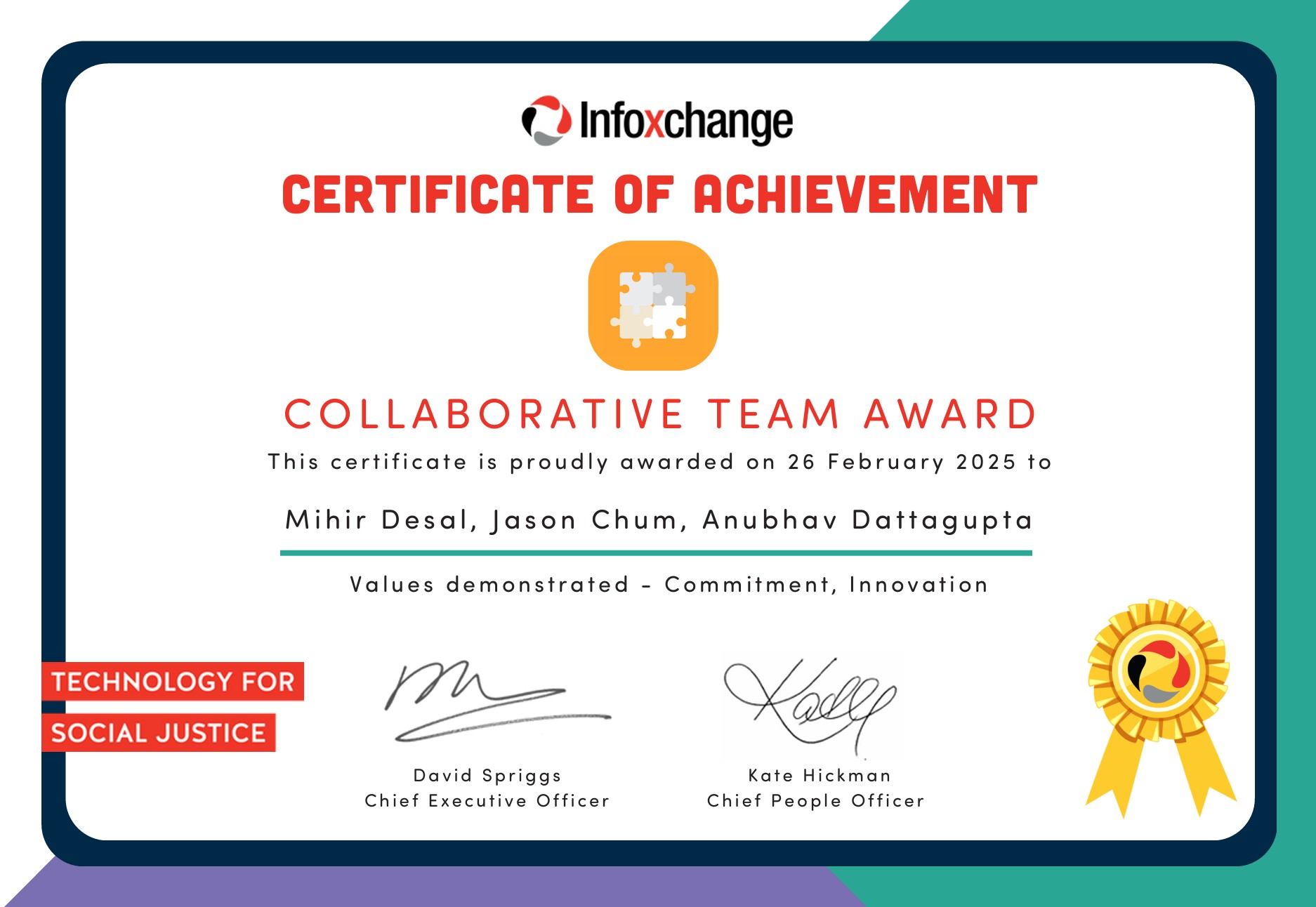My Volunteer Experience - Neil Anubhav Dattagupta
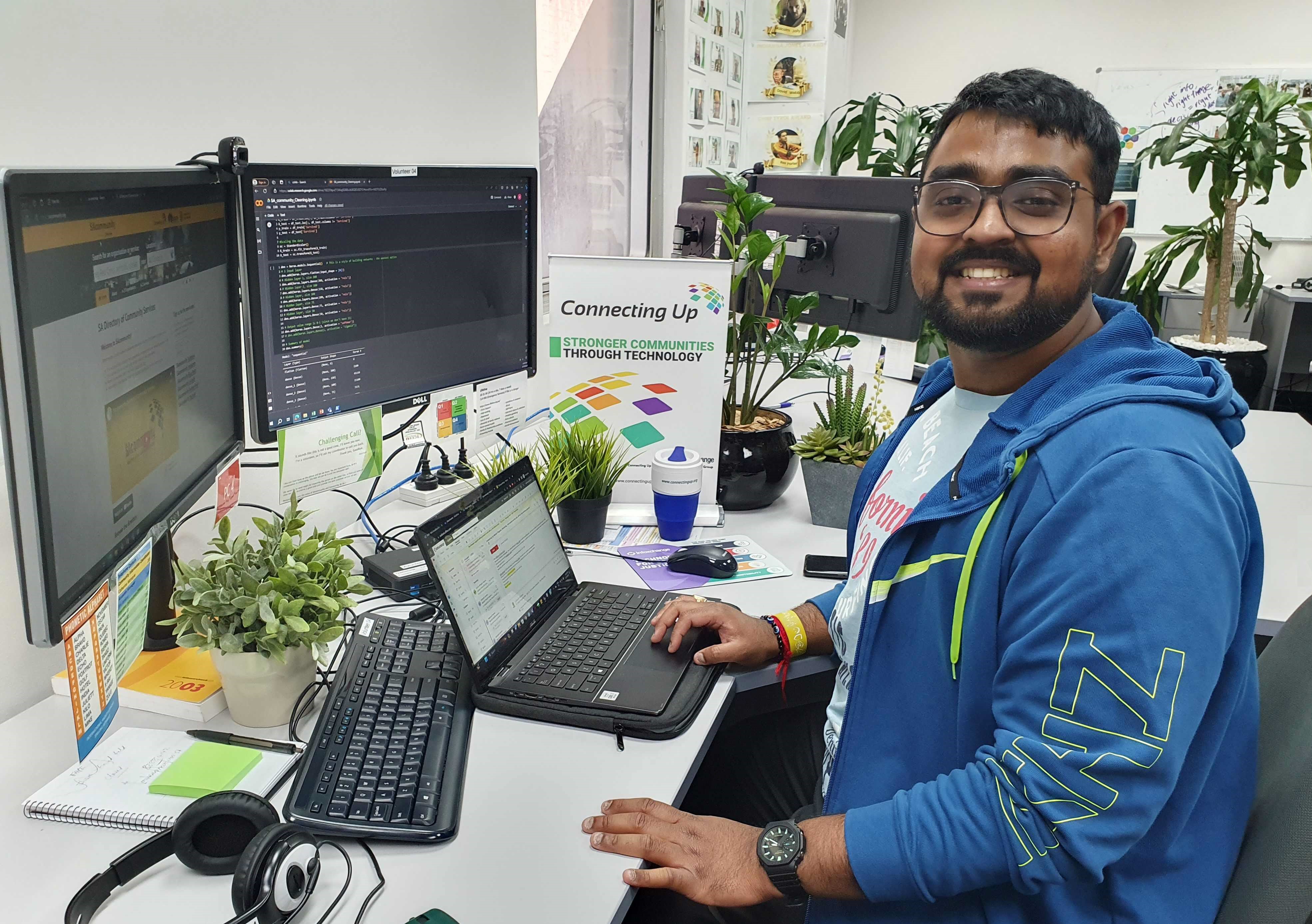
Welcome Anubhav!
Anubhav Dattagupta joined our SAcommunity Data Analytics Team as a volunteer, whilst he undertakes his Masters of Data Science at Adelaide University, starting with the team on the 2 August 2023.
He attends intermittently onsite at the Connecting Up Office around his classes, and has attended demonstrations and other volunteer events available, as well as his mentor meeting, whilst working on a data automation tasks.
Data Analytics Lead Stathis Avramis officially retired from 2 days a week, taking leave for a couple of months over August and September 2024. Over this time volunteer Anubhav Datta Gupta assisted to support the new incoming interns and volunteers joining the Data Analytics and Website Rebuild Team. Anubhav currently serves as Leads Capacity Building team and is currently acting as Lead Data Analyst during Stathis’s absence.
Total Hours 478 This Year 198 Joined 2 August 2023 Last Check-in 12 September 2025
Personal Biography
He is passionate about data science, joining Connecting Up as a volunteer to apply his skills to real-world projects of value to the local community. He aims to use the tasks and professional development opportunities available to gain further experience in data analytics, data visualisation, and python scripting, as part of the Data Analytics Team. Meanwhile expanding his networks across the SAcommunity volunteer program, engaging with the wider Infoxchange organisation, community stakeholders and partners.
Anubhav plans to pursue a career path in the Informatics and Data Analytics industry. Blending the activities of informatics involving information, processes, computer systems and technology, with the analysis of data and investigation of a range of data formats and files (audio, image etc.) to look for trends and patterns. His aim is to contribute by helping to investigate and present big data in a useful, understandable and accessible way for everyone, without them necessarily requiring an IT background.
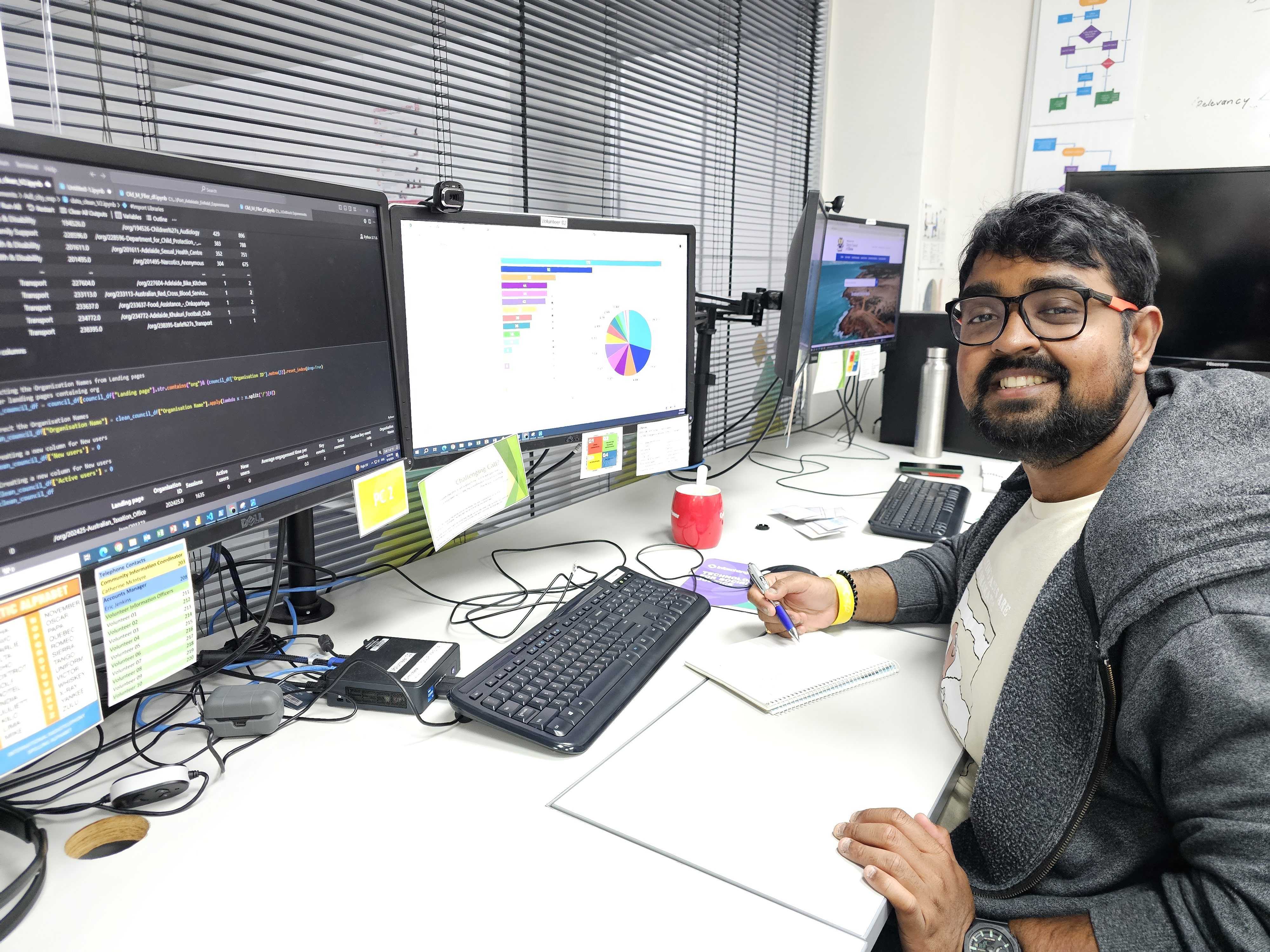
Image: Anubhav updating the report generation process.
Currently Anubhav is working on Optimizing Data Cleaning for User Traffic Reports
One of my current focuses is developing Python scripts to optimize the data cleaning process for user traffic reports. This project involves working with councils to ensure that the data is accurate, consistent, and ready for analysis. By automating and refining the data cleaning process, I'm aiming to save time and improve the quality of the reports generated.
Report Generation for Federal and State Electorates
In addition to data cleaning, I'm also developing codes for generating reports for federal and state electorates. This involves creating detailed and comprehensive reports that provide valuable insights and information for various stakeholders. The goal is to make these reports more accessible and user-friendly, ensuring that they serve their intended purpose effectively.
Capacity Building through Data Pipeline Optimization & Enhanced Reporting
Building on my earlier work with Python automation, I'm now focused on strengthening our team's foundational capabilities by overhauling the report generation pipeline. I have improved teh pipeline to handle issues with Organisation Names and redesigned ingestion workflows to seamlessly accommodate new council partnerships. Simultaneously, I'm extending our team documentation by developing adding location intelligence modules as well as multi year report guidelines.
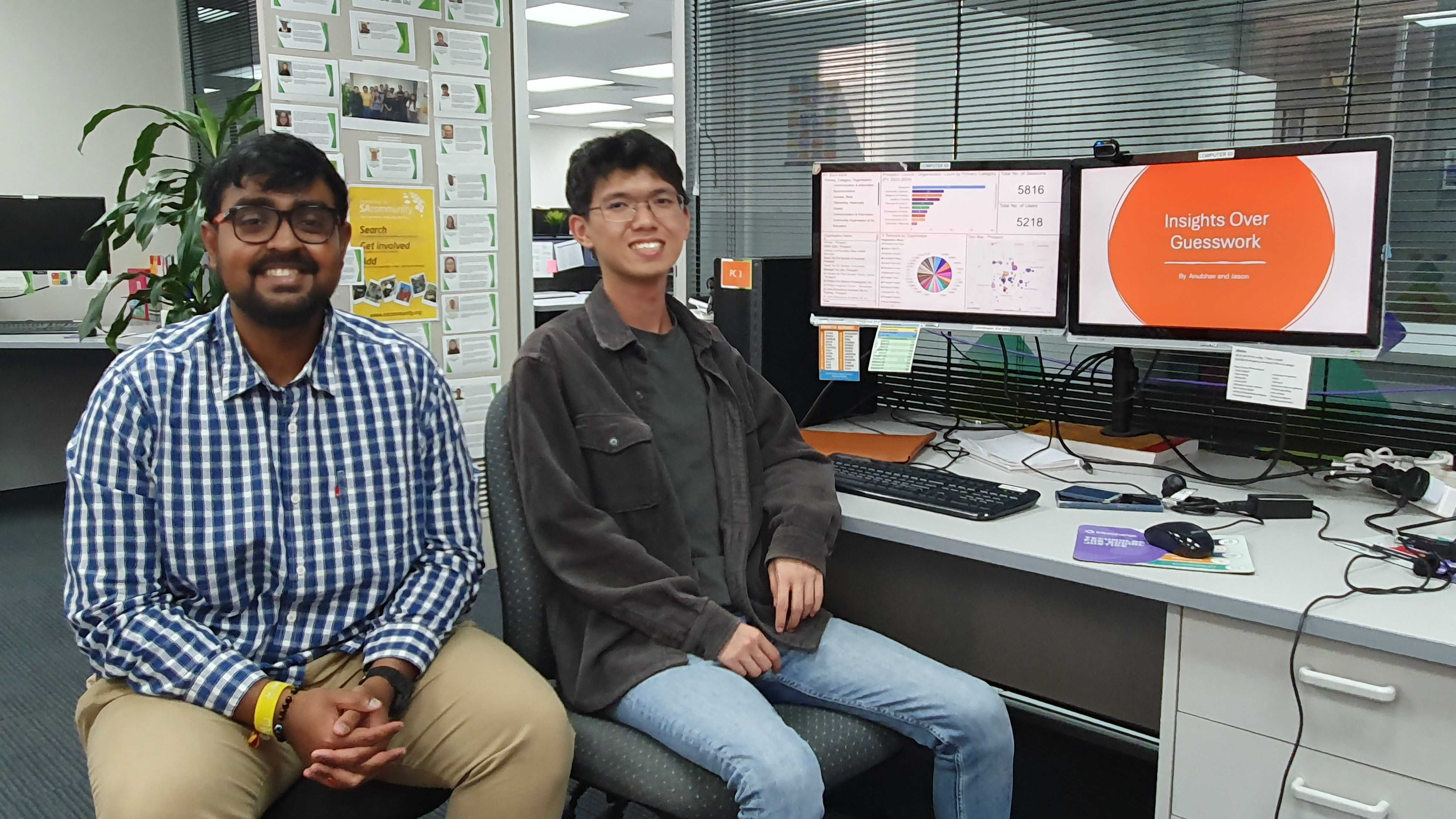
Image: Anubhav and Jason with their elevator pitch.
Elevator Pitch: Leveraging Data Analysis in SAcommunity
Anubhav and Jason recently had the opportunity to present their elevator pitch at Stone & Chalk, showcasing how they leverage data analysis to benefit SAcommunity. Their presentation highlighted the innovative ways they in which they are using data to drive insights and create positive impacts for our local communities. The link to their presentation.
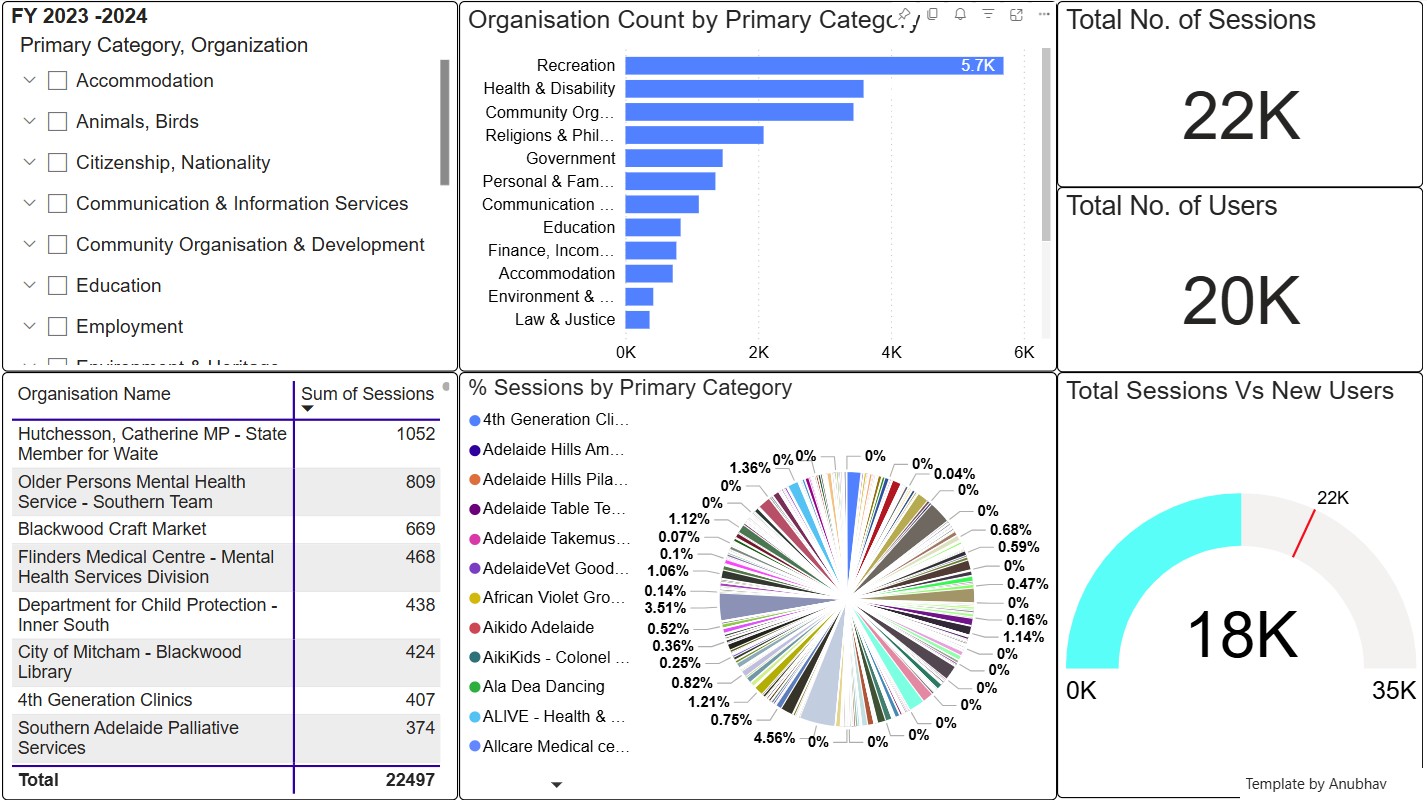
-
Recreation: 5,700+ sessions
-
Health & Disability: 3,600+ sessions
-
Community Development: 3,400+ sessions
-
Religions & Philosophies: 2,100+ sessions
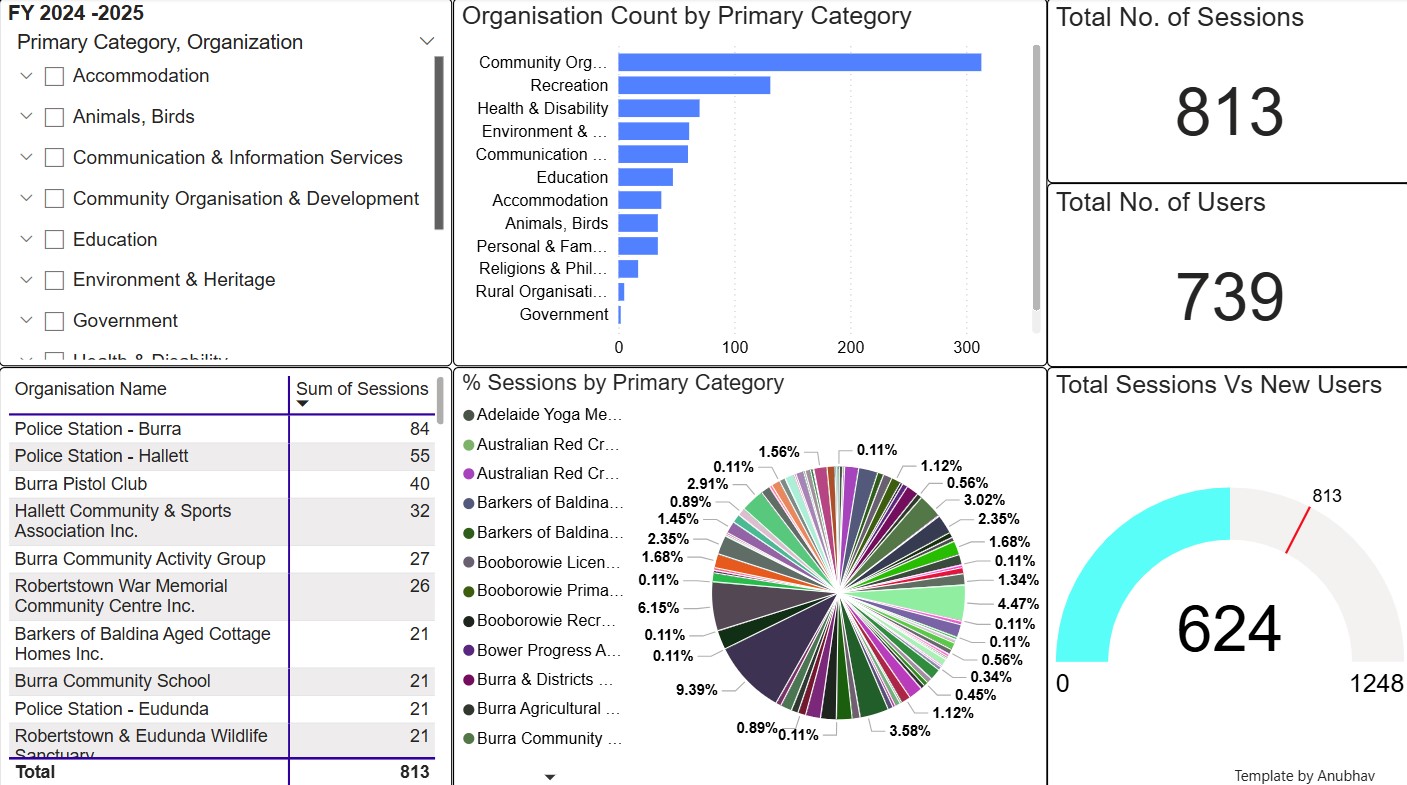
- Justices of the Peace – Marion led the way with 953 sessions
- Sarah Andrews MP – State Member for Gibson followed with 747 sessions
- RSPCA Animal Care Campus – O'Halloran Hill had 593 sessions
- Sturt Police Station recorded 500 sessions
- Alex Dighton MP – State Member for Black contributed 493 sessions
- Recreation: 6.81%
- Personal & Family Support: 5.34%
- Education: 4.24%
- Religions & Philosophies: 3.58%
- Community Organisation & Development: 3.53%

I developed CouncilTracker V2, a structured Excel-based dashboard that aimed to transformed our tracking process. The new system includes:
- A status matrix showing report completion across all councils and years (2019–2025)
- A centralized table with council codes, assigned volunteers, Power BI links, and comments
- Conditional formatting to highlight missing or incomplete reports
- A dashboard summary showing counts of completed, pending, and missing reports
This tracker allows the team to instantly filter by council, year, or volunteer, and provides a clear overview of our progress.
Since implementing the tracker, we’ve seen a significant improvement in how we manage and assign report tasks. This project also gave me the opportunity to contribute to capacity building within the team by documenting the process and sharing best practices for using the tracker.
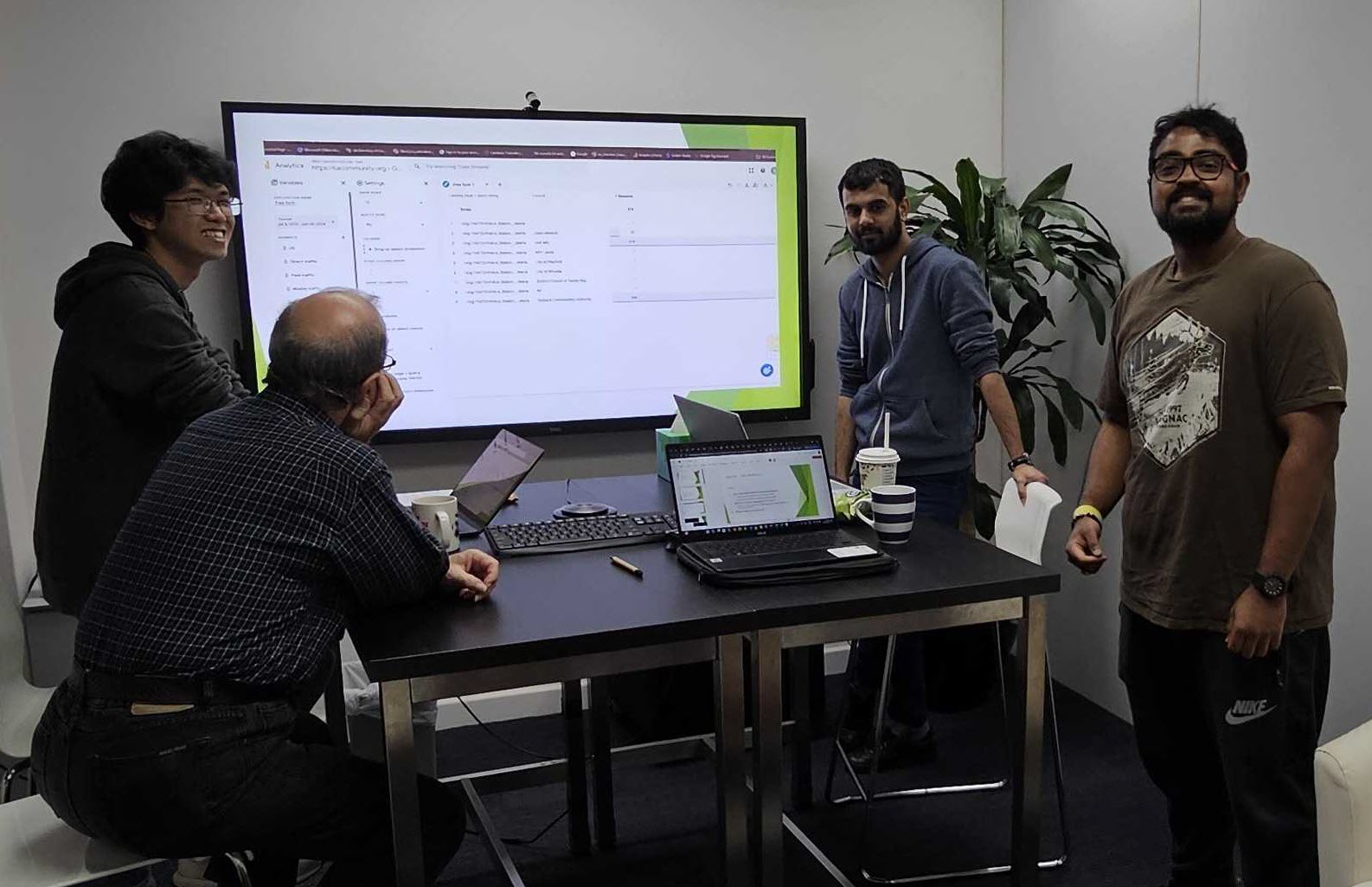
Anubhav, along with his colleagues Jason and Mihir, led a comprehensive discussion on the challenges associated with Google Analytics, presenting both short-term and long-term solutions to Catherine, James, and Stathis Avramis.
One of the primary issues addressed during our meeting was the misalignment between the Dataset Identification number and the Council. This misalignment poses a significant challenge, as discrepancies in data may arise if they do not align. To mitigate this issue, we proposed the implementation of an input consistency validator, which would display a warning error whenever the fields failed to match.
The second issue discussed was the inclusion of “/edit” as a valid session in Google Analytics. This should not be counted as a valid session, as it involves volunteers or interns editing the organization rather than representing organic user sessions. Our proposed solution was to exclude “/edit” from Google Analytics.
The final issue addressed was the frequent changes in councils and datasets, which caused the filters in Google Analytics 4 to function improperly, resulting in discrepancies in the filtered data. During our discussions, we concentrated on identifying the root cause of this problem. Through various case studies, we concluded that it was likely a systematic issue, as multiple updates occurred within a short timeframe without a clear sequence of actions.
To address this, we proposed several solutions that could lead to significant improvements. The first suggested solution was the implementation of a ticket system that notifies the admin of any changes being made, requiring admin approval before these changes are reflected on the website. The second solution involved filtering organizations based on council at the end of the financial year using a Python script. For the long-term solution, we proposed utilizing the LGA API to automate the process of obtaining council data, thereby eliminating potential manual errors.
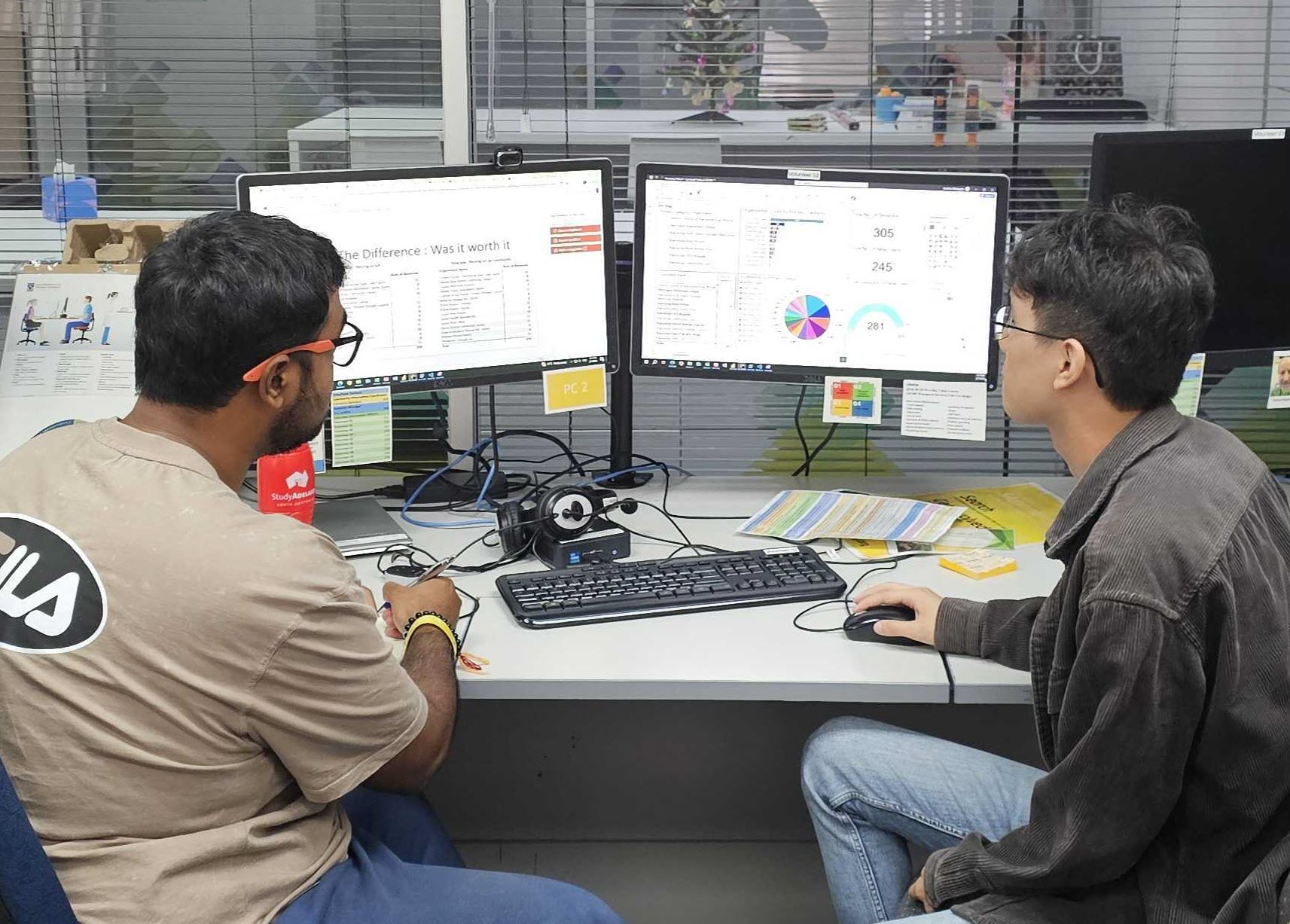
Image: Jason Chun Kwan Lam and Anubhav presenting their automation to Catherine
Image: Comprehensive Documentation
Streamlining / Documentation on council report generation
To support these projects, I've been working on creating comprehensive documentation on how to use the developed codes. This includes step-by-step guides, examples, and best practices to help others understand and utilize the tools I've created. I believe that well-documented code is crucial for collaboration and future development, and I'm committed to making my work as transparent and accessible as possible. A link to the documentation accessible by the Volunteers can be found here.
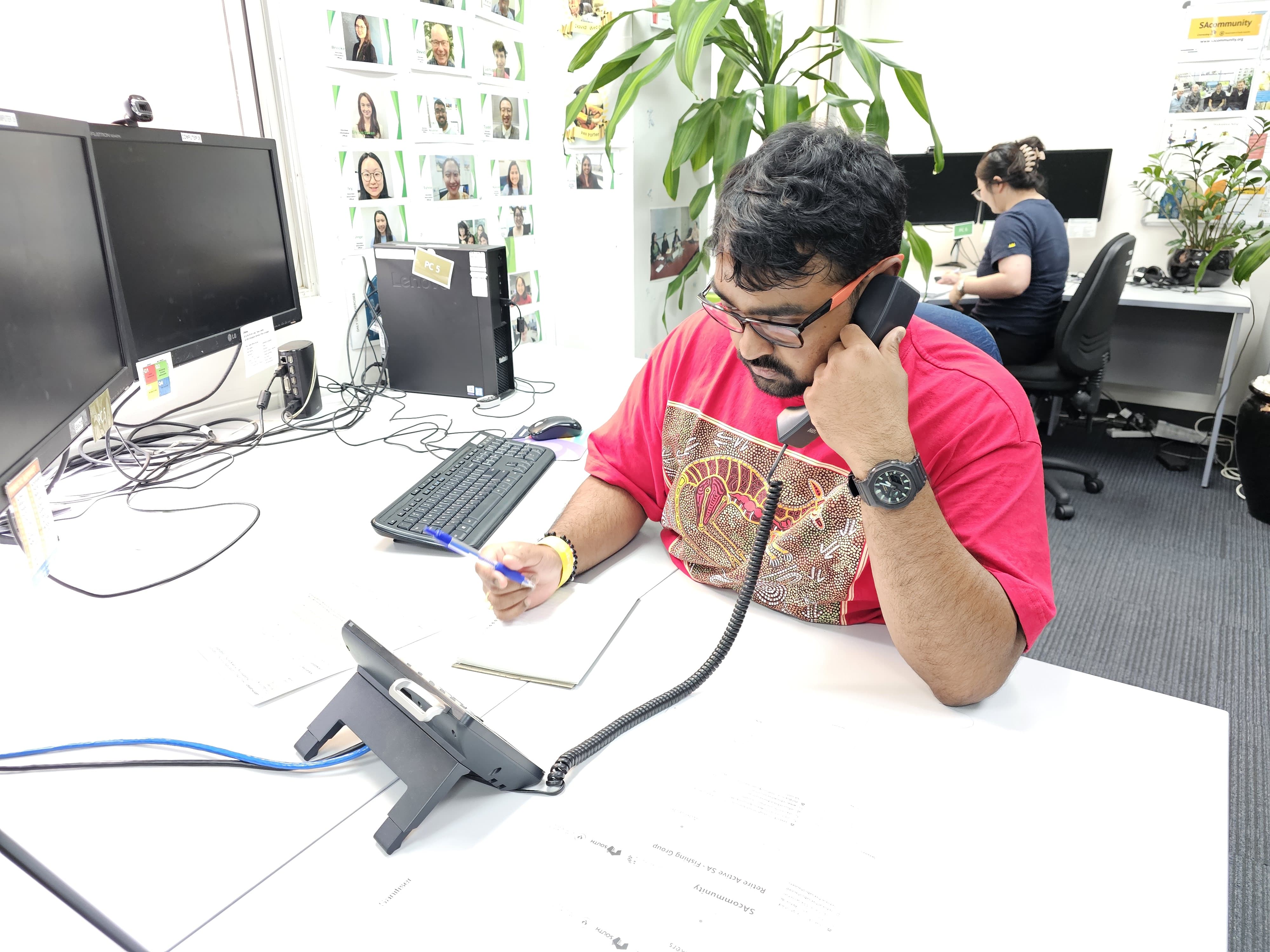
Image: Anubhav on the phone with SA - Bushwalkers 21 January 2025
Contacting Community Services for Detailed Verification
Anubhav is reaching out to community services under the Adelaide City Council to verify and update their SA Community directory entries. This initiative aims to ensure the accuracy and reliability of the information, enhancing accessibility for individuals seeking community support and services.
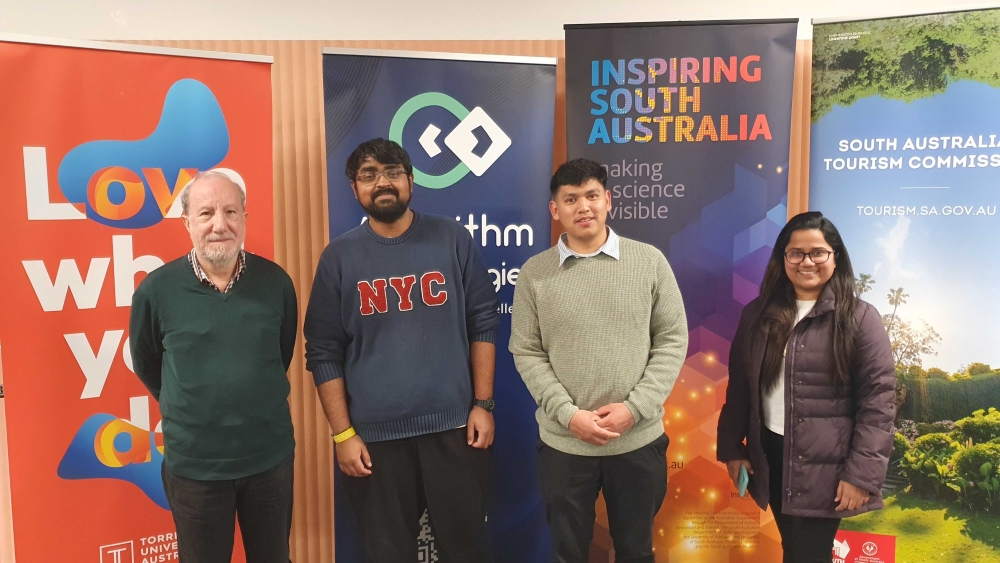
Image: GovHack Connections Event 9 August 2023
SAcommunity Data Analytics Team Volunteers: Stathis Avramis (Team Lead), Neil Anubhav Dattagupta, Govinda Gurung and Navadani Thennakoon
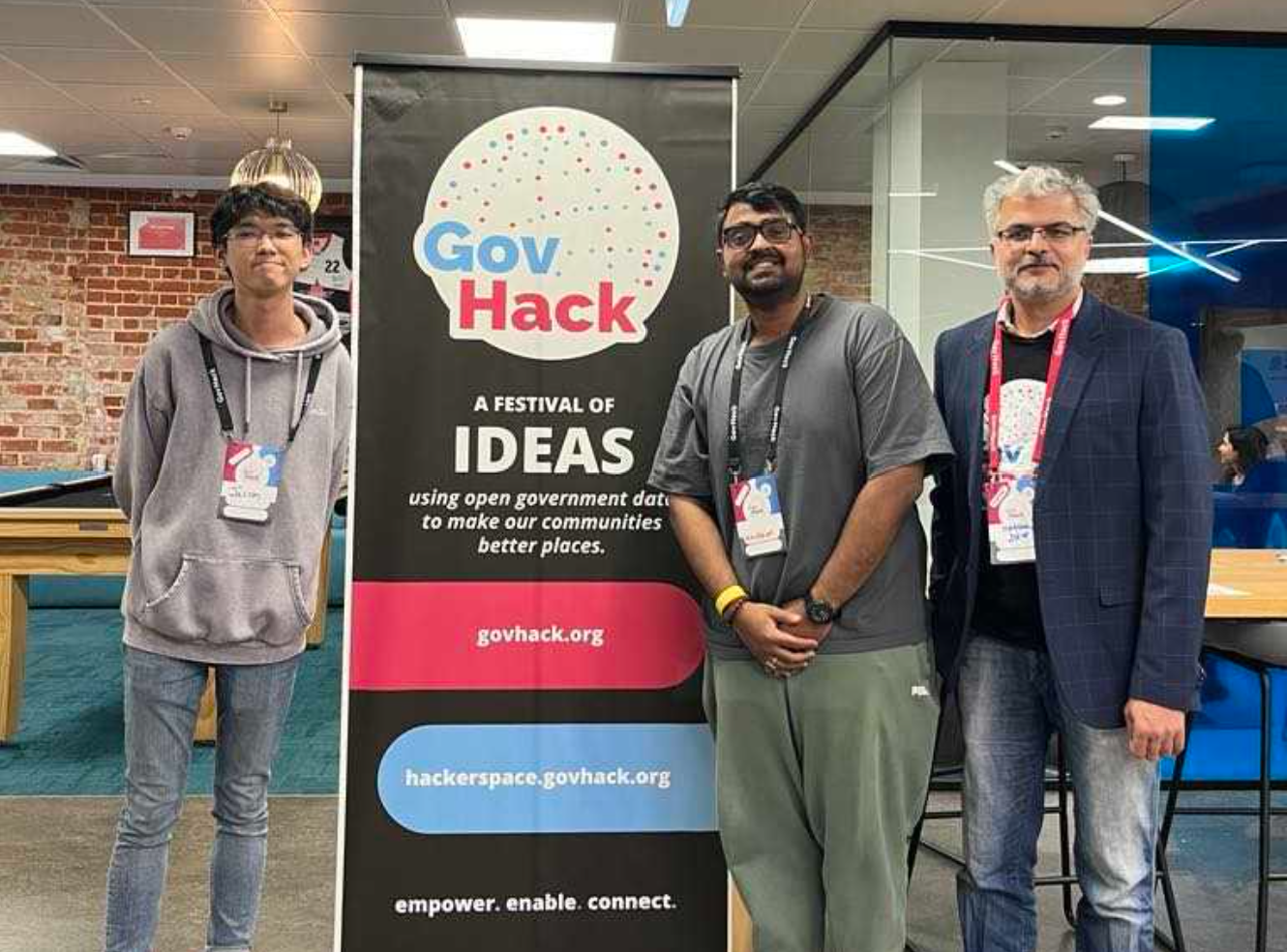
SAcommunity Data Analytics Team Volunteers: Neil Anubhav Dattagupta(Acting Data Analysis Team Lead, Jason Chun(Data Analysis Volunteer) and Harshal Dave(Board Member)
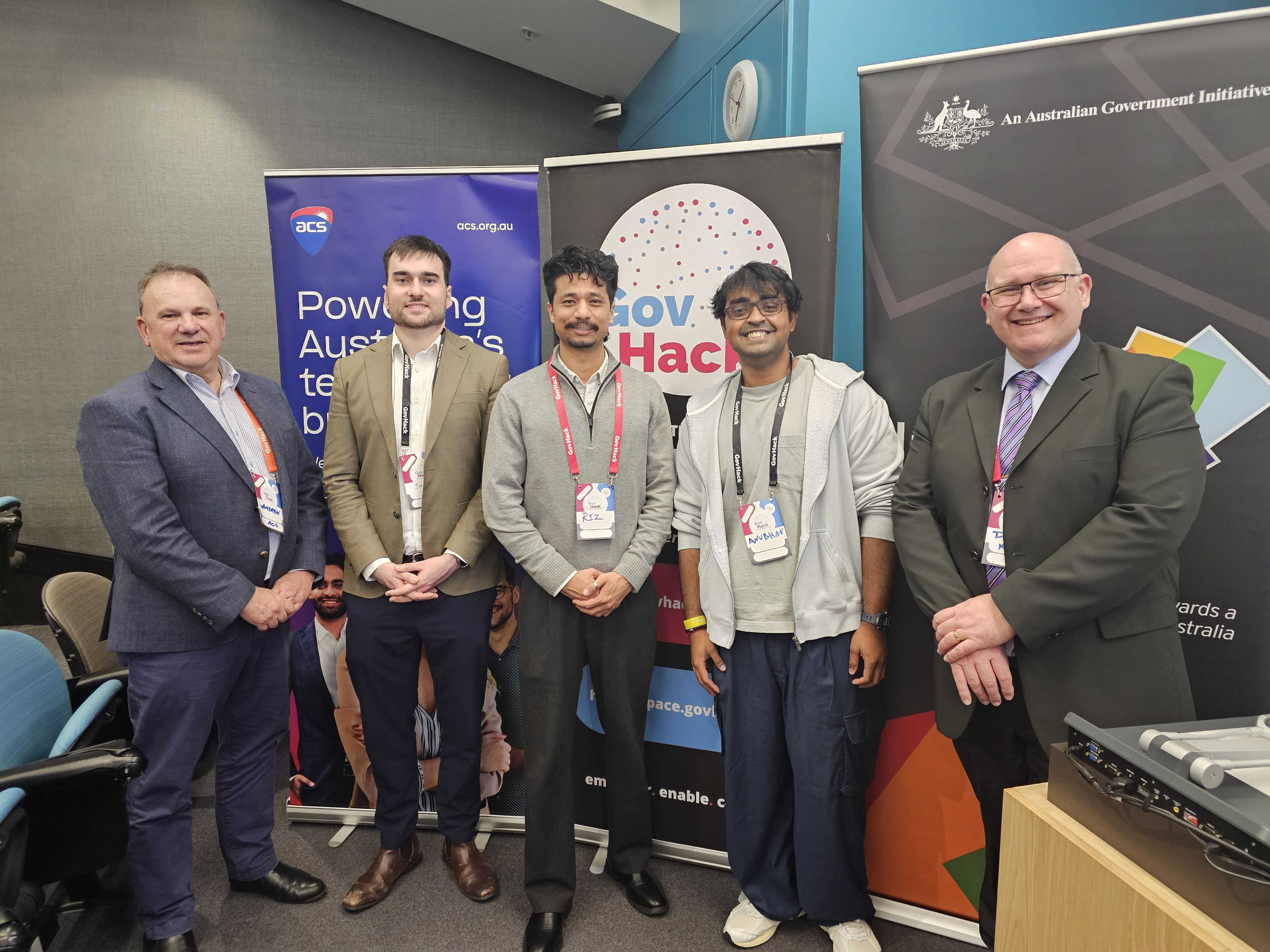
From Left to Right: Andrew Haste(ACS South Australia State Manager), Joseph O'Sullivan(ACS Member Services Coordinator), Rizan Shrestha( SA Regional Lead), Anubhav Dattagupta(Acting Data Analysis Team Lead) and Darrell Klar(Manager Scyne Advisory and Chief Orator GovHack)
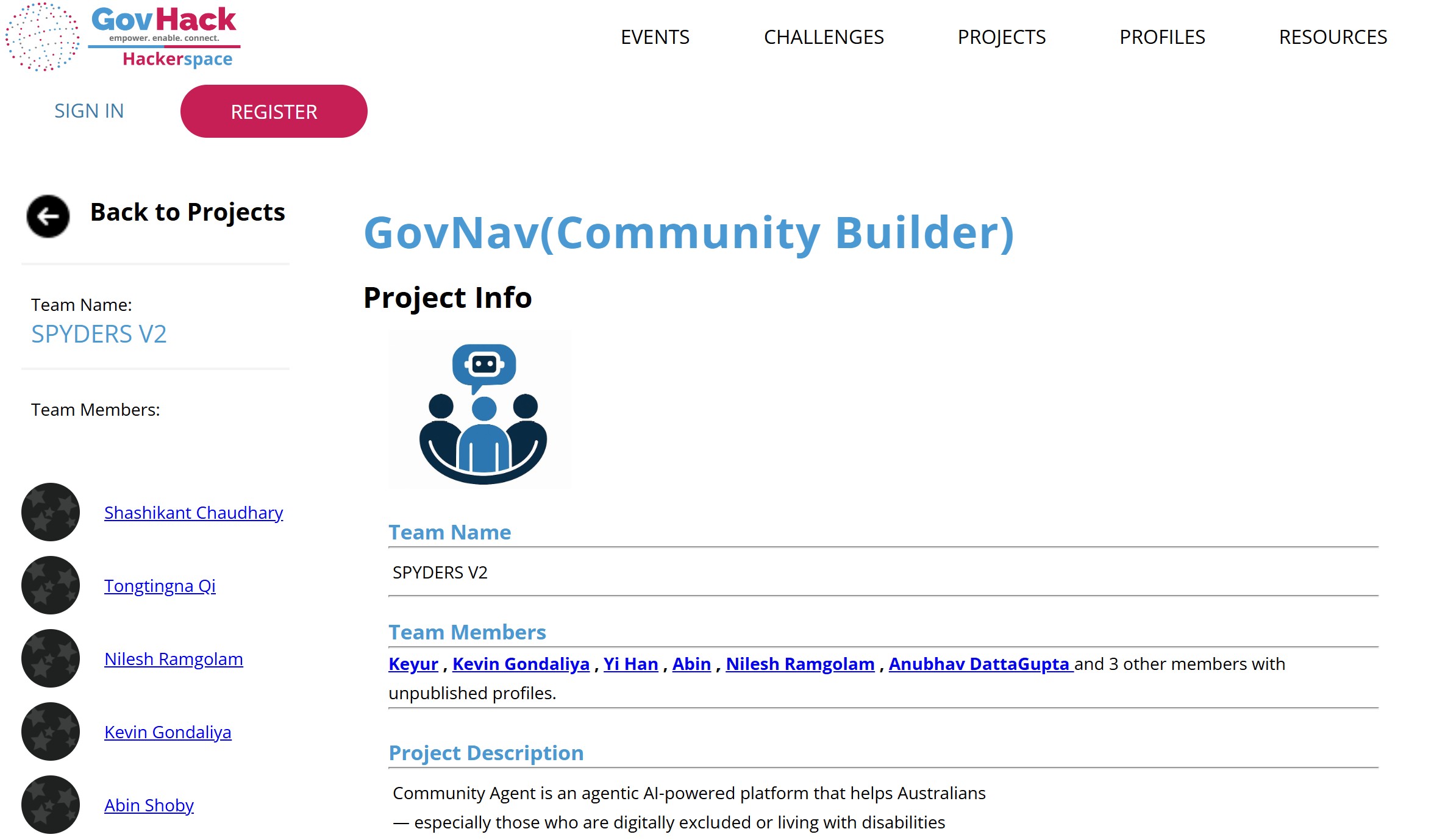
Image: My teams project which can be viewed at : Link
The interactive prototype is available for public viewing: Link.
-
Rapid prototyping and user experience design
-
Mapping user journeys for vulnerable communities
-
Designing inclusive, accessible interfaces for digitally excluded populations
Taking part in GovHack 2025 provided an invaluable platform for exploring innovative applications of open data and collaborative design methodologies to address pressing community challenges.
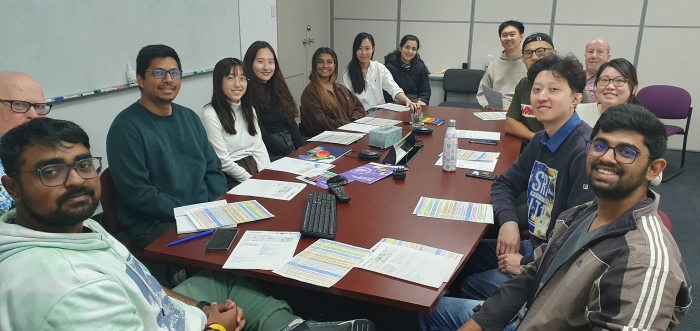
Community & Cultural Events & Activities
International Women's Day Afternoon Tea and Talk 13 March 2024
During the event, our Chief Operating Officer, Jo Davies, recounted her professional trajectory, which left me genuinely inspired. Despite embarking on her career path relatively late in her late twenties in the United Kingdom, she has ascended to the pivotal role of COO at Infoxchange. What particularly resonated with me was the fact that her academic background did not encompass studies in the field of Information Technology. Jo's narrative imparted a valuable lesson – that through unwavering determination and a willingness to capitalize on opportunities as they arise, individuals from all walks of life possess the potential to achieve remarkable feats, irrespective of their prior experiences or educational disciplines.
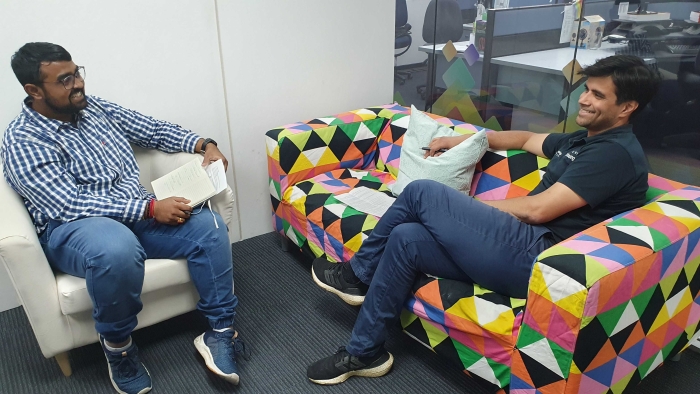
Image: Volunteer Neil Anubhav Dattagupta with Pankaj Chhalotre, Head of Connecting Up
Mentor Meeting
Pankaj's journey, starting from his internship at Connecting Up to leading the program, painted a fascinating picture of the organization's growth. It resonated deeply as I envision a similar trajectory in leveraging data-driven insights to tackle challenges and empower communities. Understanding Connecting Up's evolving roles and responsibilities provided valuable context for the potential impact I could make in similar organizations.
Witnessing Pankaj's diverse tasks within program management offered a practical perspective on leadership in this field. Seeing his ability to strategize, manage teams, and drive meaningful outcomes solidified my interest in pursuing a data-driven leadership path. His insights into fostering team collaboration and navigating complex projects were particularly valuable, equipping me to better contribute to data-focused teams in the future.
Pankaj's personalized advice on differentiating myself in the data analytics/machine learning space was incredibly helpful. Based on his guidance I'm currently exploring integrating data analysis projects in my field of interest, participating in relevant online communities and discussions. This active approach, combined with highlighting my transferable skills in problem-solving, communication, and critical thinking, will help me stand out among job seekers.
Staying updated in the ever-evolving tech landscape is crucial. Pankaj's recommendations for resources like online courses on specific machine learning algorithms, industry publications like Analytics Magazine, online blogging sites like Medium resonated deeply. I'm committed to continuous learning through these resources and others, ensuring I possess the latest knowledge and skills to excel in the data analytics/machine learning field.
Job hunting with a master's degree.
Pankaj's advice on navigating the job market as a recent graduate resonated deeply. I'm now focusing on specific actions based on his guidance like networking with professionals, and connecting to prospective employers on LinkedIn.
Summary
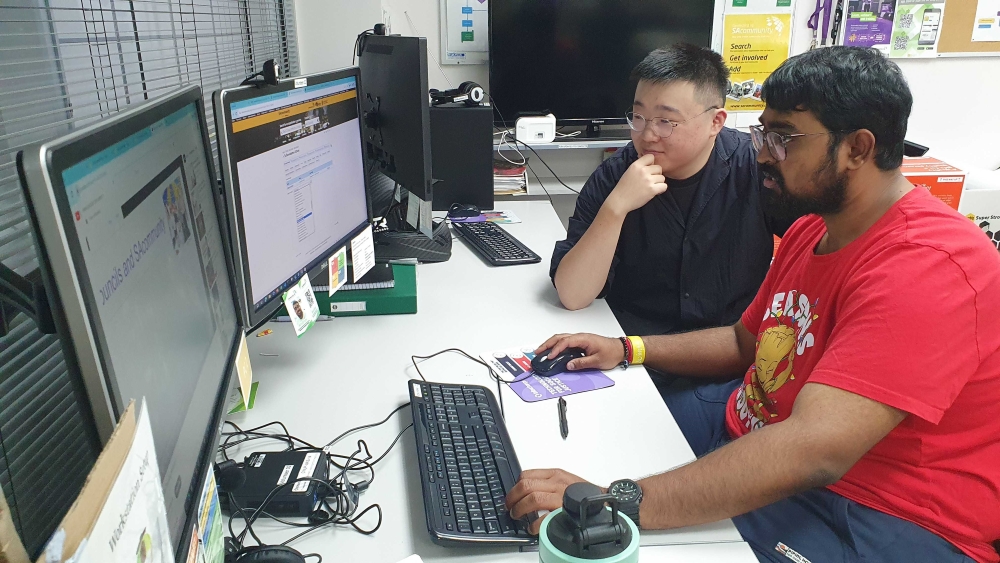
Training and Development - Digital Learning Platform
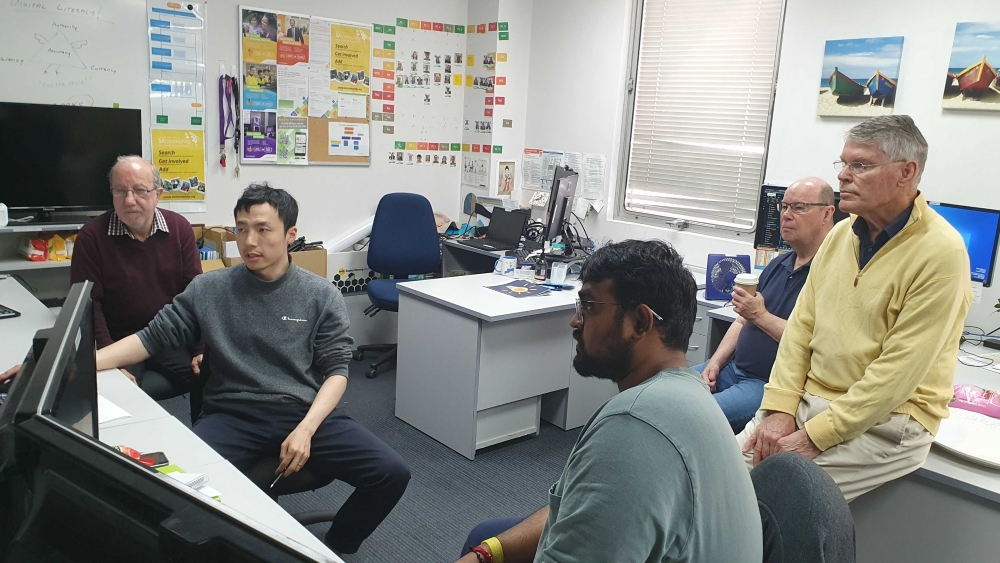
Image: Kane demonstrating hist Kangaroo Island Council Reports using visualisation tools in Power BI including ArcGIS. Pictured: Volunteer Stathis Avramis, Intern Kane Hengchuan Zhao, with Volunteers Neil Anubhav Dattagupta, David Webb and Chris Baldwin
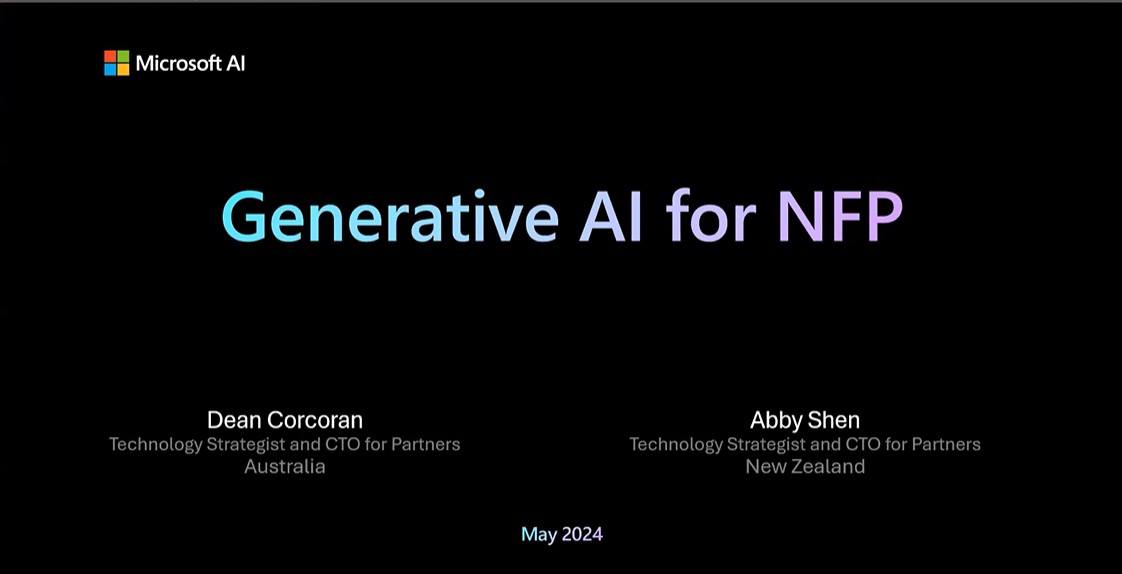
Leveraging Microsoft's generative AI tools
I had this opportunity to be a part of the Microsoft webinar on Leveraging Microsoft's generative AI tools on held 1 November 2023. I found this webinar to be a great introduction to the suite of offerings microsoft has for generative AI and this would be extremely useful for introducing NFP organizations to powers of generative AI. As a student currently studying in this field I am aware of employing caution while using these models and not blindly trusting their output. One great takeaway from this webinar was the LinkTree provided at the end which has all the free to use links for various generative AI platforms offered by Microsoft.
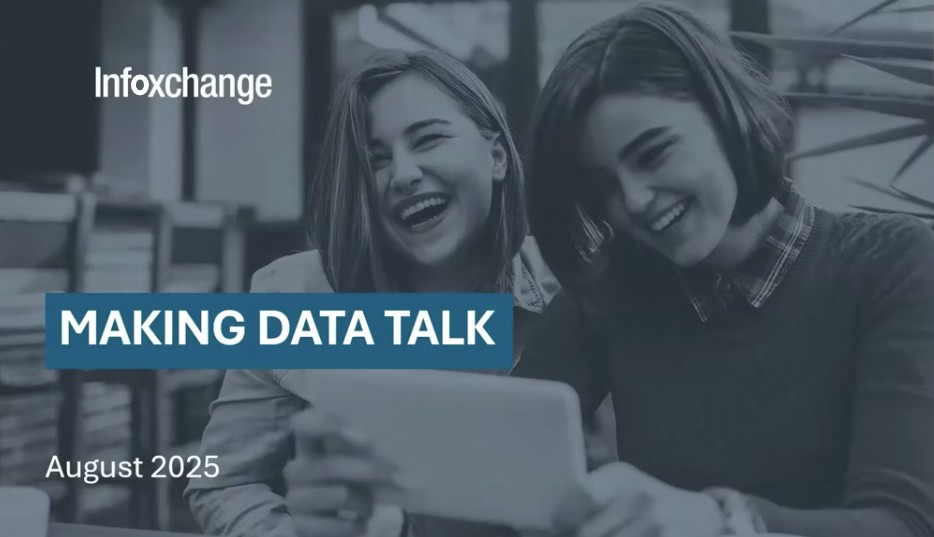
The session underscored why this is important: combining data provides crucial context for decision-making, supports funding applications and advocacy, helps identify new opportunities, and validates an organization's impact and outcomes.
A key takeaway was the safe and effective use of AI in this process. The guidance was clear: never upload personally identifiable information or entire internal files to public AI tools. Instead, use general descriptions, synthetic data, or small excerpts when seeking advice on finding relevant external datasets or analysis structures.
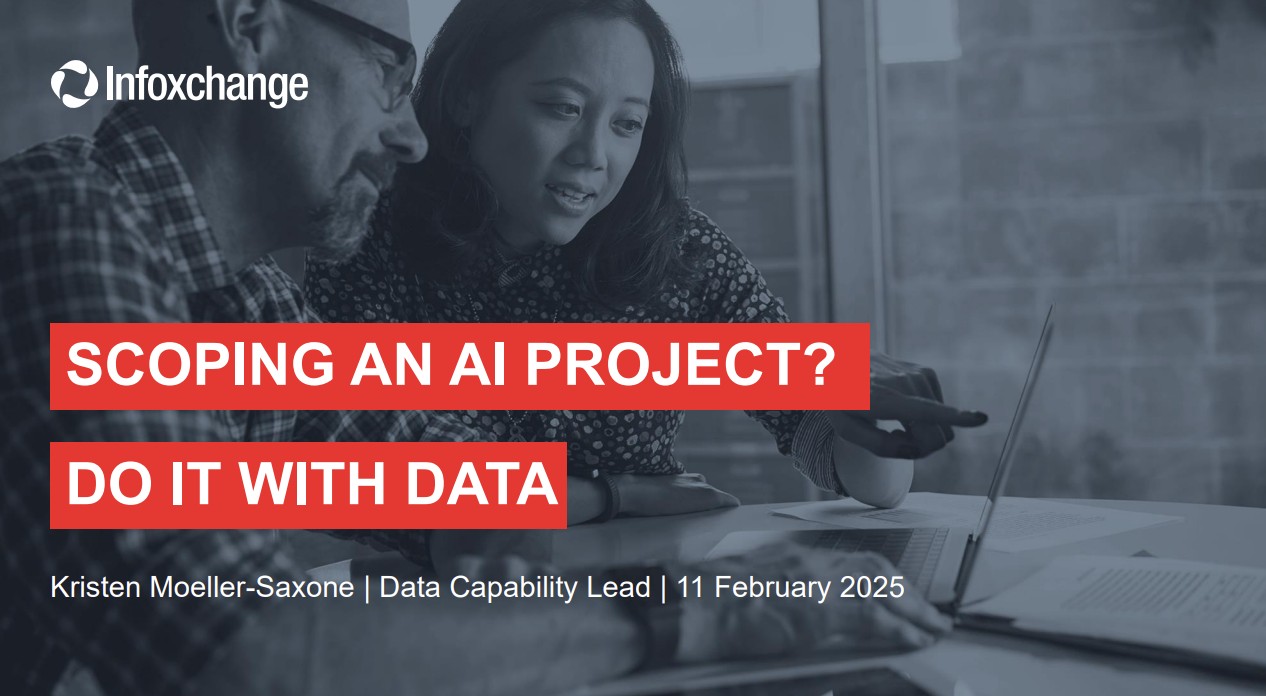 Image: Scoping an AI Project webinar
Image: Scoping an AI Project webinar
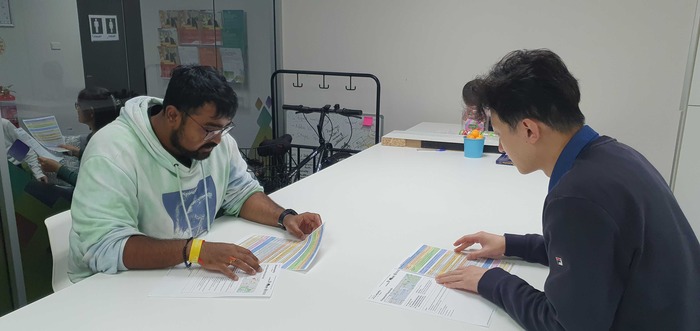
Image: Anubhav with Volunteer Yi Han practicing Telephone Techniques scenarios
Training and Development - Telephone Techniques
The Data Analytics Team members undergo a series of telephonic and communication training sessions to enhance their understanding of the organization's directory and data collection methodologies. These sessions equip them with the necessary skills for data cleaning and updating their individual dataset information. Ultimately, the training focuses on introducing and presenting their data reports effectively to the council stakeholders. Similar to the students' elevator pitch practice, these telephonic technique meetings emphasize the importance of repetition and practice for achieving proficiency.
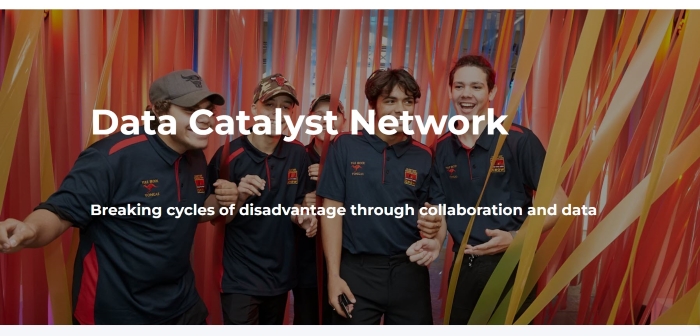
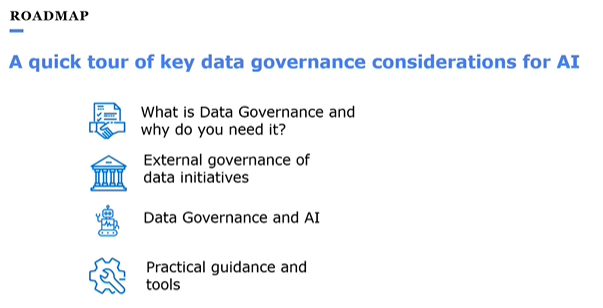
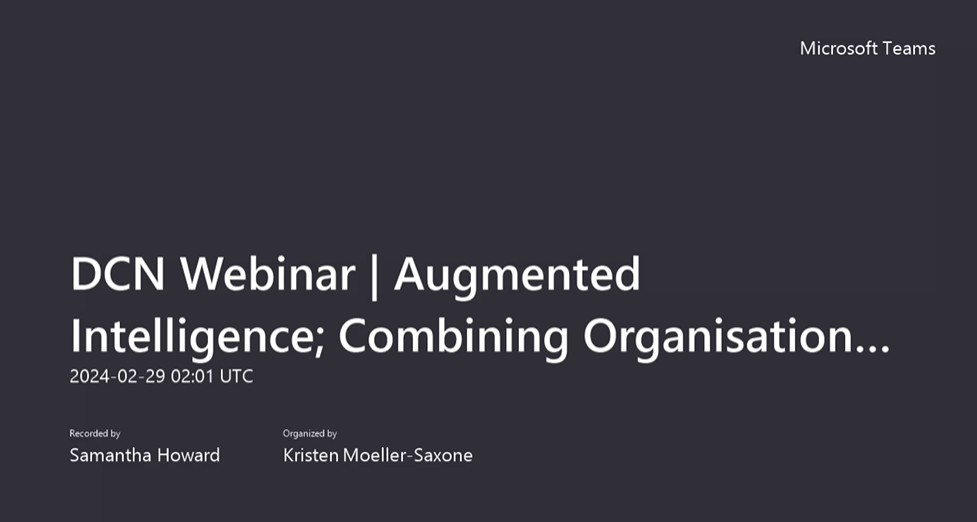
Image: Interns Jay Shijie Zhang, Volunteer Camille Sze Pui Ko, Interns Olivia Thi Kim Oanh Nguyen, Mostafa Didar Mahdi, Jamie Jiemin Zhang and Volunteer Neil Anubhav Dattagupta joined one of the Data Catalyst Network webinars
DCN Webinar | Augmented Intelligence: Combining Organisation Data with Large Language Models
The webinar was presented by Amir Aryani, Head of the Social Data Analytics Lab at Swinburne University.Amir discussed the concept of "augmented intelligence," which involves combining organizational data and expertise with large language models (LLMs) like GPT. The key idea is to have domain experts vet and control the data fed into the AI system, as well as interact with it through prompts. This process happens recursively, allowing the system to continually learn and improve.
The goal is for the AI to act as an assistant to domain experts, supporting existing operations rather than replacing human decision-making entirely. Amir drew a parallel to self-driving cars, where the AI augments but does not replace the human driver.He emphasized integrating AI as a complementary component into existing workflows, rather than aiming to fully automate processes with AI agents. While full automation may be possible in the future, the current focus should be on leveraging AI's capabilities to enhance human expertise.
Amir also highlighted recent advancements in generative AI, such as Meta's investment in open-source LLMs, Nvidia's GPU sales growth driven by AI compute demand, and OpenAI's release of the Sora model for generating realistic videos from text prompts. He showcased examples of Sora-generated videos that are remarkably realistic, raising concerns about distinguishing AI-generated content from reality.Overall, the webinar advocated for an "augmented intelligence" approach that responsibly combines human expertise, organizational data, and the capabilities of large language models to drive innovation and efficiency
DCN Webinar | The Evolving Cyber-Security Threat Landscape
The webinar was led by the global threat intelligence team, which meticulously researches and tracks the activities of cyber criminals and threat actor groups to understand their motivations and methods. This session provided a comprehensive overview of the current cyber security threats impacting the not-for-profit sector. The team shared insights on a range of challenges these organizations face, from persistent phishing schemes to sophisticated ransomware attacks, emphasizing the importance of robust security measures.
Throughout the webinar, the team drew parallels between the digital threats and real-world scenarios, underscoring the critical need for vigilance and proactive defenses. They highlighted the collaborative efforts of their researchers, who delve into the dark web to monitor the evolving tactics of cyber adversaries. The goal is not just to react to threats but to anticipate them, providing not-for-profits with the tools and knowledge necessary to safeguard their operations and missions.
In addition to discussing current threats, the team showcased recent advancements in cyber security technologies and best practices. They explored innovative solutions and strategies that organizations can adopt to enhance their defenses, ensuring that even in an ever-changing threat landscape, they remain resilient and secure.
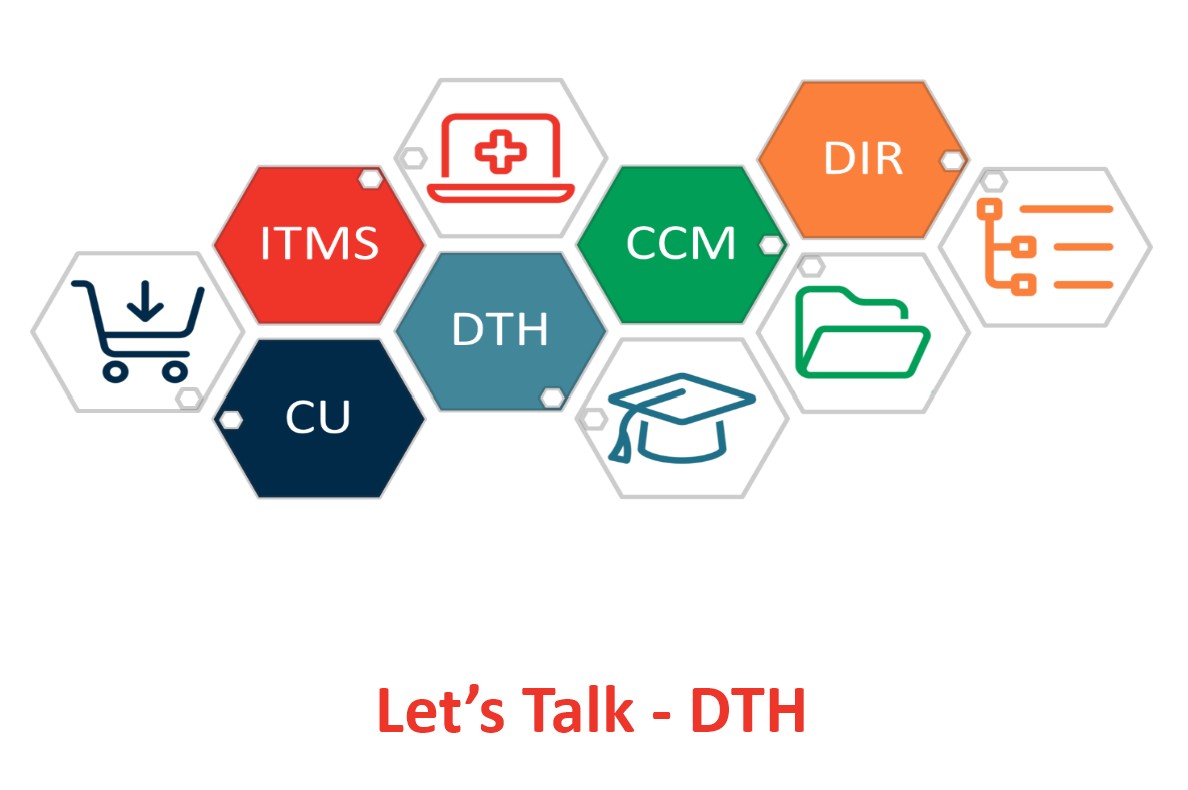
Image: Let's Talk Webinar | Introduction to DTH
Let's Talk Webinar | DTH
Volunteers: Rex Porter, David Webb, Alexander Bull, Chris Baldwin, Anubhav Dattagupta, Jason Chun Kwan Lam and Van Lam Nguyen
Photo: Harsh's Birthday Celebration on at SAcommunity with Anju, Tien, Alex and Jason
This blog has been a testament to my passion for data science and its transformative potential in solving real-world problems. From volunteering with SAcommunity to leading data analytics projects, participating in hackathons, and engaging in professional development, every experience has been a step toward leveraging data for meaningful impact.
As a volunteer, I took on the role of Acting Data Analytics Lead, mentoring interns and driving key initiatives like automating report generation, optimizing data cleaning processes, and delivering comprehensive analytics reports for councils. Projects like the Mitcham Council report and the MedTech Hackathon showcased my ability to combine technical skills with innovative thinking to address complex challenges.
Highlights of this journey include proposing AI-driven solutions at GovHack, presenting findings to stakeholders, and building connections through events and mentorship programs. Insights from mentors like Pankaj Chhalotre and participation in webinars on AI, data governance, and cybersecurity have further enriched my understanding of the field.
Through it all, the central theme has been clear: data is a powerful tool for driving insights, improving processes, and creating positive change. Whether it’s through Python scripts, Power BI visualizations, or generative AI tools, I’ve seen firsthand how data can transform challenges into opportunities.
As I look to the future, I am excited to continue exploring innovative data solutions, expanding my expertise in AI and machine learning, and contributing to projects that make a tangible difference in communities. This blog is not just a reflection of my journey but also an invitation to others to see the endless possibilities of data in creating a smarter, more connected world.
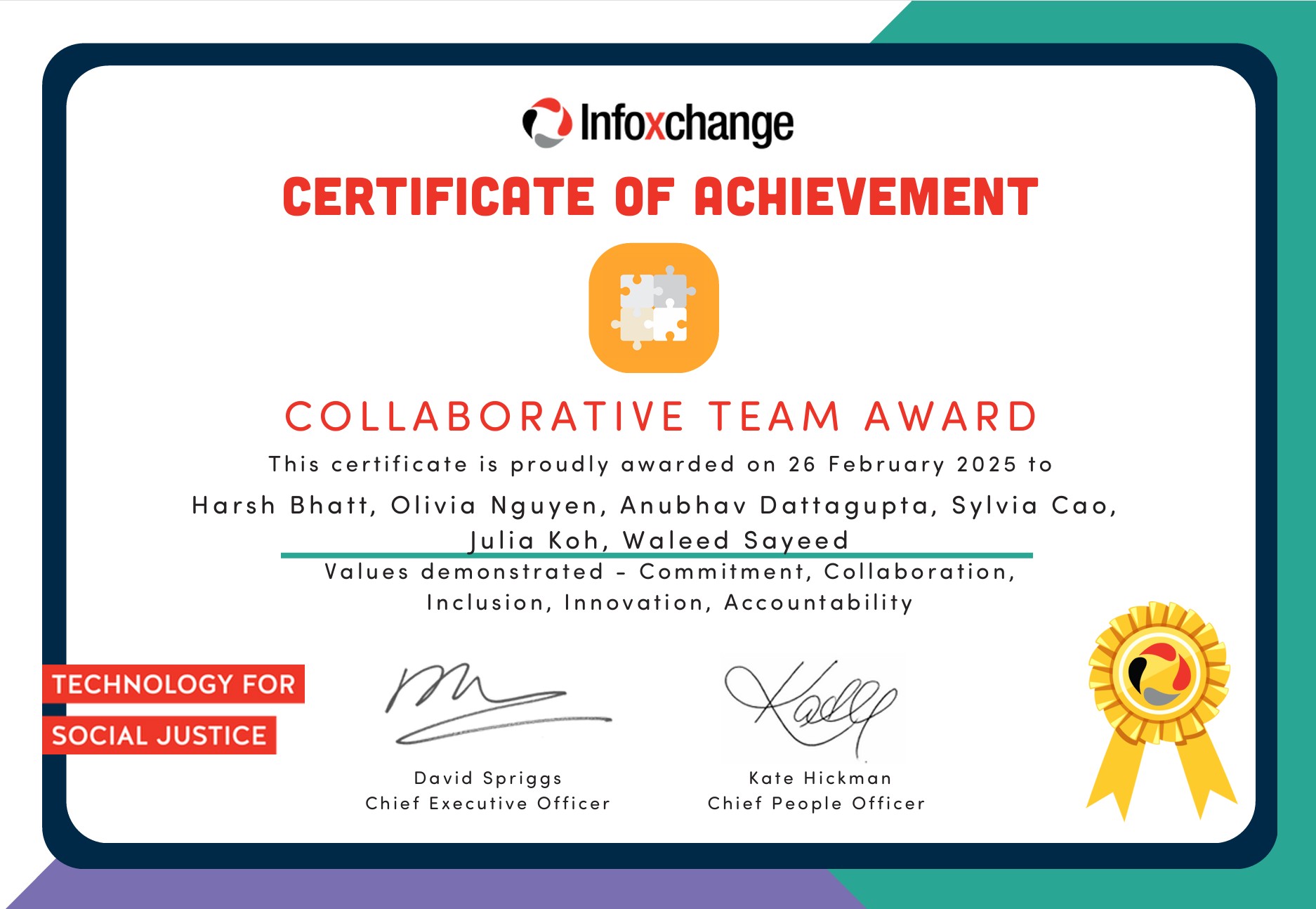
Sign up for the newsletter!
Subscribe to our monthly newsletter to receive news, information and events for the community sector in SA.




